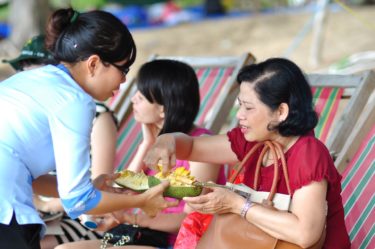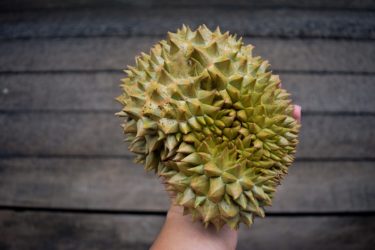Creamy. Pungent. Bitter. When put together, they’re three words which sound extremely unappetising. Yet, the same three words also describe the durian – one of Southeast Asia’s most beloved fruits, so popular it is even been affectionately termed the King of Fruits.
Here in Singapore, the semi-annual durian season is met with snaking queues that stretch across blocks, every queueing individual itching to sink their teeth into the delicious delicacy. During peak period, durians can be found at dedicated roadside fruit stalls, with each fruit selling for between S$10 and S$50, with the most expensive durian being auctioned off in Thailand for a whopping S$65,000.
Singapore’s love for durian has shown itself in numerous ways, with even national architecture being likened to the thorny fruit. Children often have their first taste of durian at a young age, which leads to one of two possible outcomes: the child loves the fruit and grows up to become a durian lover, or they absolutely detests it and grow up to become a durian hater.
When it comes to durians, there is rarely an in-between; Singaporeans either love it or hate it. But regardless of whether you’re a durian lover or a durian hater, you’ll almost certainly have heard some of the shared stories and myths about durian that have been passed down through families and generations.
When I asked him to think back to the first time he ate durian, 24-year-old Singaporean Jason Ho smiled, and told me about the various stories he remembers. “When I was young, my parents told me that it’s a must to drink saltwater from the durian husk after eating durian, and I’ve just done it all my life,” he says.
The tradition of drinking salt water out of durian husks once you’ve finished with the fruit stems from Traditional Chinese Medicine (TCM) beliefs, which are common among older generations of Singaporeans, who in turn pass their beliefs to their children. According to TCM, food can be classified as either “heaty” or “cooling”. “Heaty” foods are believed to warm the body and improve blood circulation, but excessive consumption results in fevers and sore throats. Conversely, “cooling” foods are said to help to dispel toxins and heat from the body, but too much leaves the body “damp” and “cold”. TCM followers believe the body should have a balance of “hot” and “cold” in order to function at its ideal state.

When it comes to durian, TCM teaches that the salt water has “cooling” effects which can reduce toxins and neutralise the heating properties of durian. It is believed that without drinking salt water post-durian consumption, individuals could easily develop sore throats and fevers due to the “heatiness” of the fruit. Drinking the salt water out of the fruit’s husk is also said to remove any lingering bad breath. However, none of these beliefs have any scientific backing, they appear to simply be an act of tradition – a ritual passed down from the older generations.
In Singapore, as in many Asian cultures, listening and respecting elders is seen to be of great importance, partly due to the influence of Confucianism. As such, much of the misinformation that the elders had heard of in their youth gets passed down to their children, with younger generations often accepting it as the truth without questioning.
For durian seller Sam Kwek (not his real name) who was born and raised in a durian plantation in Malaysia, he does not see drinking saltwater from durian husks as essential. However, he still offers the option to customers at his store.
“There are other durian stores offering saltwater to customers after their meals”, he told me. “If I stop offering (saltwater in durian husks), my customers are going to go to competitors’ stores instead.”
Sam is not the only durian seller who feels this way. Singapore’s deeply rooted “fear of missing out” culture, colloquially known as “kiasu” culture, results in many durian sellers continuing to offer saltwater in durian husks to their customers – regardless of the seller’s beliefs. As a result, unaware customers may be persuaded that they can’t afford to miss out on the supposed benefits of saltwater, consumed from a durian husk, simply because their durian seller offers it as an option.
Durian-ed to death?
Drinking saltwater out of durian husks is not the only story that still impacts the generations today. “My parents also mentioned that if durian and alcohol are taken together, it may cause sudden death. I’ve seen people debunk this online, but I still avoid eating the two together to play safe,” says Jason.
The concept of durian and alcohol being a jinxed combination also appears to have been influenced by TCM beliefs, which claim alcoholic drinks have heating properties, too. Therefore, according to TCM believers, when a “heaty” fruit like durian is consumed with a “heaty” drink like alcohol, effects of discomfort and bloatedness may be heightened, possibly resulting in indigestion and heartburn. In reality, the likelihood of sudden death caused by consuming the two together is incredibly low.
From a scientific perspective, studies have found that durians contain sulphur compounds, which may hinder the liver from properly breaking down alcohol when the two are consumed together. Additionally, durians contain high amounts of carbohydrates and fibres, so it is possible that consuming it in large quantities may lead to feelings of discomfort and bloatedness. Thus, while the idea that consuming durian and alcohol together will lead to sudden death seems to be just a myth, it could be true that mixing the two could lead to some discomfort.
While we may not know exactly where and how this misinformation originated, it seems to stem from good intentions. Again, as Asian cultures traditionally hold elders in high regard, the younger generation tends to believe without questioning in what they are told. Thus, the story of durian and alcohol causing sudden death could have been created as a way to protect others from the discomfort that they may experience from eating the two together. Hence, it is of no surprise that this myth has withstood the test of time.
Since durian and alcohol is still a combination of food that is not recommended due to the risk of indigestion and discomfort, this story poses a warning to both durian and alcohol fans alike – only consume the two together if you are prepared for the discomfort that your body may need to firefight afterwards.
Is the durian watching you?
Consumption myths are not the only stories that have been passed down through generations. Growing up in a durian plantation, Sam tells the story of how there was a myth that durians have “eyes”.
“When I was much younger, it was believed that durians would not fall on a person’s head, no matter how long you stood under a durian tree. They were thought to have magical properties just like that, but of course we now know that it’s not true.”
The myth of durians never falling on people’s heads could have been made up to provide ease of mind and reassurance to plantation owners, who had to worry about the thorny fruit splitting their head open when it drops from trees. For Sam, growing up in a family of durian farmers meant regular trips to the plantation. He recalls experiencing a feeling of anxiety whenever a durian falls in close proximity to where he stood, but says that he has never been injured by a durian.
“I don’t remember my father wearing any hats or helmets when going to pick durians, and he’s done it all his life too.” As seasoned professionals, durian plantation owners are in their natural element standing under durian trees and do not see the need to wear protective headgear. Still, whilst the likelihood of a durian falling on a person’s head is miniscule, it does not mean that non-occurrence is guaranteed, and multiple cases exist of fatal head injuries caused by the heavy, spiky durian fruit falling. Perhaps it is wise to wear a hat or helmet when going durian picking, just in case the durian decides to close its “eyes” on you.

Interestingly, Jason had never heard of the story of durians having “eyes” – neither from his family nor from his friends. In fact, when he first heard about this myth, he laughed, taking out his smartphone to do a quick online search to see if the story was true. “Sounds ridiculous, why would anyone believe that?”, he asked me.
That this myth is less widely known in Singapore could be due to the fact that durian plantations are mostly located in Malaysia or Thailand – Singapore imports most of its durians, since land constraints restrict the availability of durian plantations. As such, it is unsurprising that the story of durians having “eyes” was not readily passed down from the elderly generation to the younger ones in Singapore – it could have been simply brushed off as a tale, given that it holds little to no impact on the way Singaporeans consume durian today. As evidenced by Jason, the generation born in the digital era would likely flock to search engines to do more research on the legitimacy of the story, before believing it.
Yet, when asked why Jason continues to believe in traditions such as drinking from durian husks when there is no scientific evidence behind this belief, he says that it is better to be safe than sorry.
“I trust that my parents only want the best for me, they wouldn’t tell me anything that could potentially harm me. I’ll do the same if I were in their positions too. Plus, I’ve eaten durian in this manner since I was young, so it’d feel weird if I suddenly stop doing it.”
Myths arise from tradition
Unlike the “eyes” myth, which sent Jason reaching for his smartphone, stories passed down through multiple generations of Singaporeans are given the benefit of the doubt, as they are believed to have protected those who came before us. Deeply rooted in the Asian culture, traditions and myths similar to the durian ones are often handed down using speculation and beliefs that are not backed up by science, as an attempt to prevent harmful consequences from occurring.
In many ways, it is no different from the spread of misinformation and fake news through messages on WhatsApp, which were especially rampant among the elderly during the height of the COVID-19 pandemic. While the misinformation surrounding durian is not as severe as the ones surrounding the pandemic, the underlying belief that the friends and family who send these messages have your best interests at heart results in people accepting these messages as the truth, without conducting fact-checks.
While the stories surrounding durian are on the most part harmless, it illustrates the cultural aspect of Singapore – a society that has maintained its traditions, despite being one of the most digitalised nations globally.
It is possible that the myths and misinformation surrounding durian will fade away and disappear in the generations to come, but one thing is for certain – Singapore’s love for durian will never die out.
Should you come across durians in the future, try not to shy away from it due to its creamy consistency, pungent smell, or bitter taste. Give it a shot, and you may just find that you become a fan of the King of Fruits.



